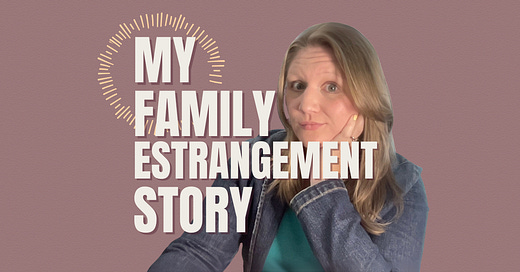Grief is often associated with death—the loss of a loved one, a finality that cannot be undone. But what about the grief that comes when the people we love are still alive, yet no longer present in the same way?
For those who leave a high-control religion or experience a major shift in political beliefs, estrangement from family—especially parents—can be an unexpected and painful reality. Whether the break is spoken or unspoken, whether you are fully no-contact or just navigating an emotional distance that wasn’t there before, the grief is real.
For some reason though, it is almost feels taboo to openly acknowledge this grief. There are no funerals, no societal rituals to mark the loss, no collective language to process the heartbreak of watching relationships erode under the weight of fundamental differences.
Emotional estrangement is complex because it isn’t just about losing a relationship—it’s about losing a sense of belonging, a shared history, and even parts of your own identity.
If you’ve lost connection with your parents or family due to your changing beliefs, I relate.
Wanting to be known
I used to think that if I could just explain my beliefs well enough, my parents would open their eyes and see me. The day I realized that wasn’t true was the day I stopped trying.
One moment, we were talking about my weekend plans; the next, I was being told that I was lost. The clarity that washed over me was harsh yet comforting—like a tidal wave sweeping me out into the deep, cooling the sunburn of being stuck in one place too long.
This relational tsunami had been building energy for some time, mostly because new energy was stirring in me as I confronted beliefs that no longer supported my spiritual growth. I felt trapped by the rigidity of my fundamentalism—gradually waking up to the high-control systems I had been steeped in for so long.
I tried to share some of this energy with them, but they wanted to hold me in their thoughts as the girl they once idolized for her zealous adherence to the system that trapped them too.
They were not comforted by the cool waters of freedom.
The moment of swift separation came when I decided that our conversation about weekend plans demanded more context if they were ever going to join me in the future I was creating for myself. I broached the awkward topic of going on a date with someone not approved by the church. When met with challenge, I confidently shared my process of moving toward freedom—my journey of questioning and untangling myself from rigid beliefs.
Their response hit like a crashing wave: elevated voices, derogatory questions, and rejection wrapped in religious language.
They told me I wasn’t a good Christian, wasn’t following the “Basic Instructions Before Leaving Earth” (BIBLE), and that I was choosing my own sinful desires over God’s truth.
My radical honesty had been an invitation, not a rebellion.
They did not see me.
And explaining myself did nothing.
Decades of investing in drawing them close through participation in the unwritten rules of engagement could no longer hide how far away they actually were.
The illusion of relationship was dissolving.
I stayed in the deep for a while, hoping they would notice what my experience was and empathize. Typically I would come back to shore and make sure they were okay. But this time, I was not okay with abandoning myself.
I wanted to keep trying. I wanted them to find the lifeboat that could meet me where I was and allow us an opportunity to collaborate together a way forward. Instead, they left me in the deep— safer on shore I suppose.
I understood, but it still hurt when they accused me of abandoning them.
Ambiguous Loss (they’re here but unreachable)
My father tried to respond to my invitation by not raising his voice the next few times I saw him. Instead, he presented as slumped, burdened, and uneasy. It was sad to
Keep reading with a 7-day free trial
Subscribe to Flourishing Exvangelical by Jillian Houghton to keep reading this post and get 7 days of free access to the full post archives.





